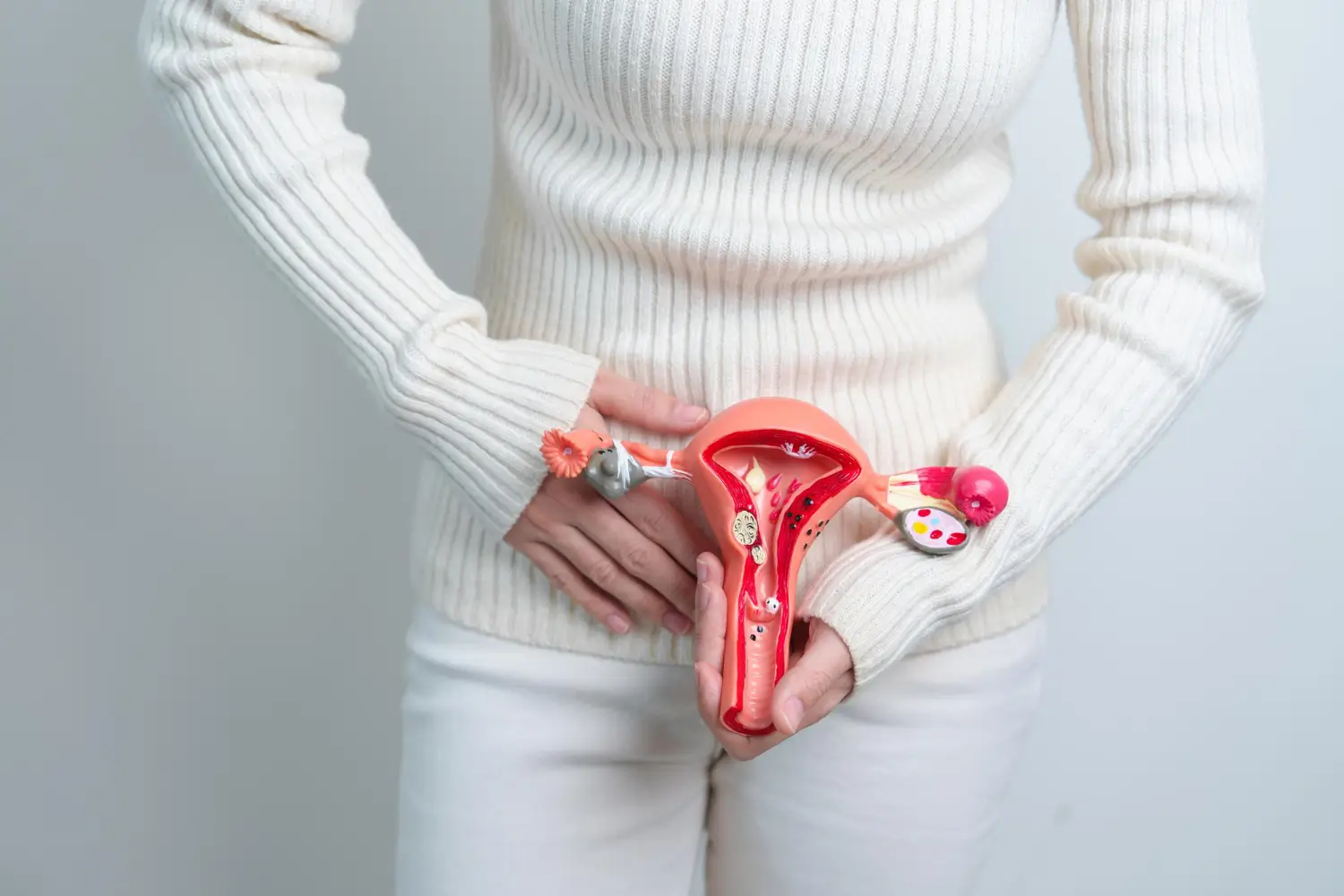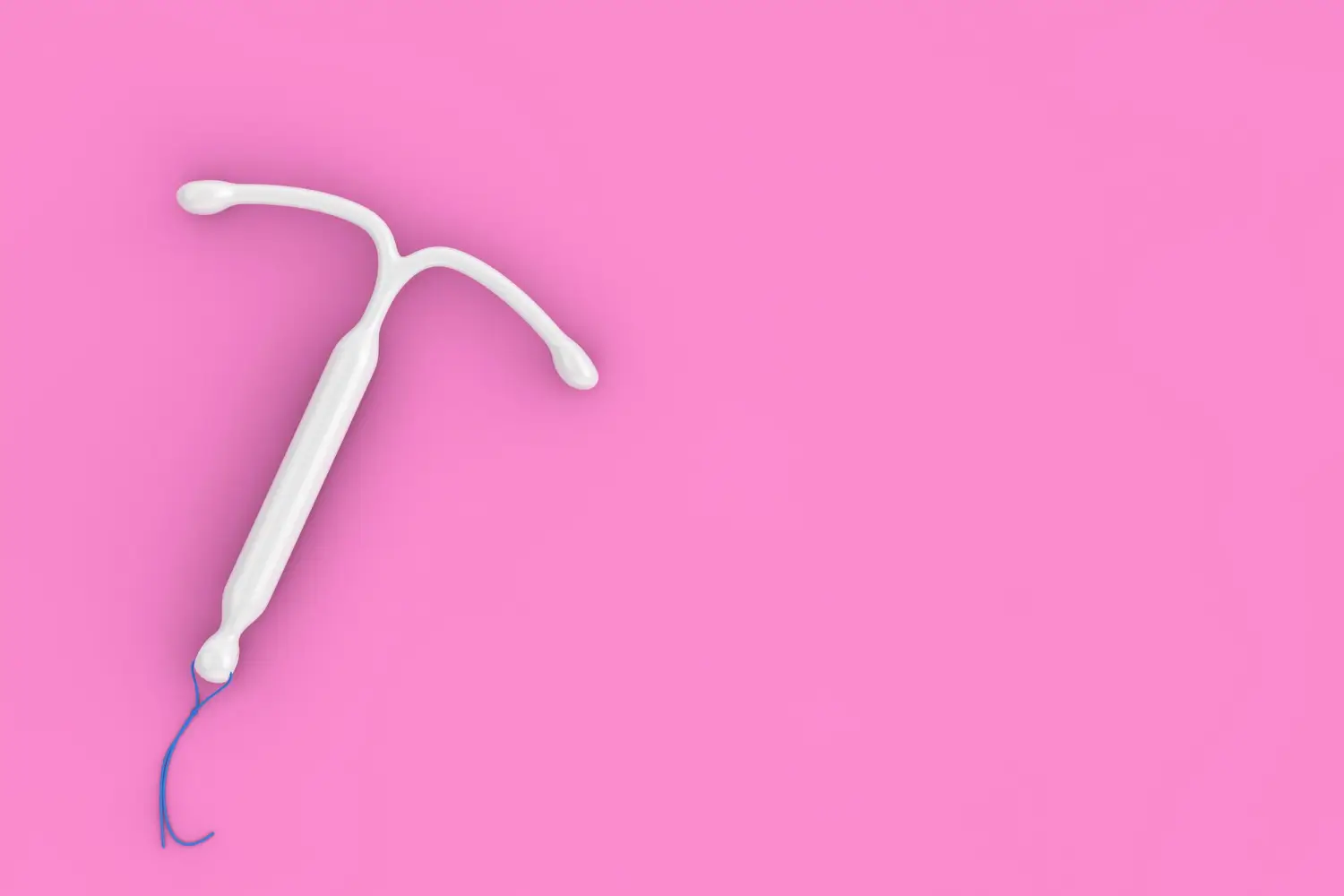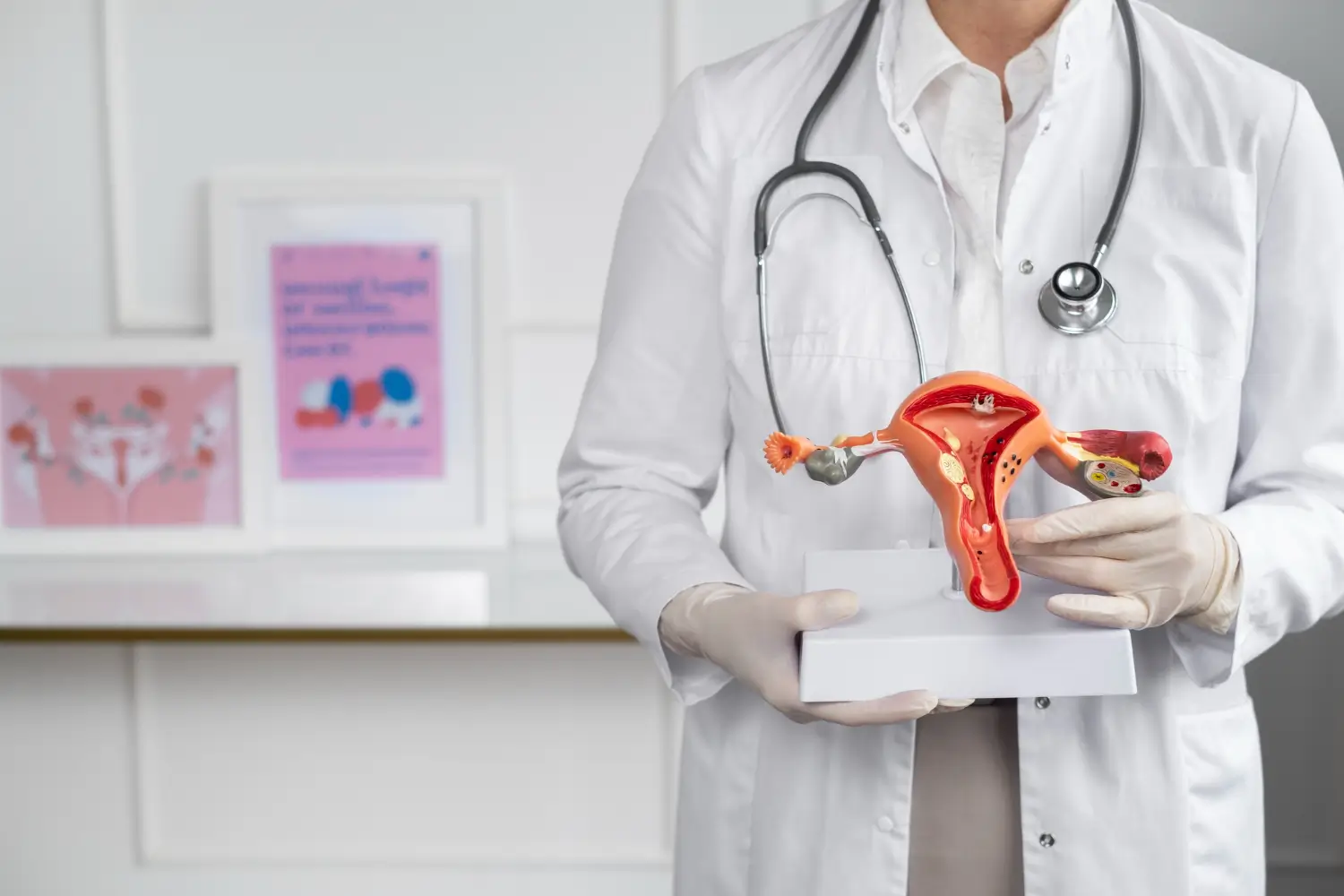
PCOS, or polycystic ovary syndrome, affects 6 to 12 percent of women of reproductive age in the United States, making it one of the most common hormonal disorders among women. This condition can cause symptoms such as irregular periods, excess hair growth, and severe acne, significantly impacting quality of life.
Mirena, a hormonal IUD, offers more than just contraception. By releasing a small amount of levonorgestrel, Mirena can help manage PCOS symptoms like heavy menstrual bleeding and painful periods. Its targeted hormone delivery makes it a popular option for those seeking relief from PCOS symptoms.
In this article, we will explore Mirena IUD and PCOS symptoms, providing insights into its effectiveness and benefits for those struggling with this condition.
Key Takeaways
- Polycystic ovary syndrome (PCOS) is a common hormonal disorder affecting women of reproductive age, characterized by irregular periods, excess hair growth, and other symptoms.
- Mirena, a hormonal IUD, can help manage PCOS symptoms such as heavy menstrual bleeding, painful periods, and hormonal imbalances by releasing a small amount of levonorgestrel.
- The targeted hormone delivery of Mirena makes it a popular option for those seeking relief from PCOS symptoms, while also providing long-term contraception.
- Clinical evidence and patient testimonials suggest that Mirena has shown promising results in managing PCOS symptoms, including regulating menstrual cycles, reducing heavy bleeding, and aiding in reducing androgenic symptoms such as hirsutism and acne.
About: DoctorMedica is your trusted supplier of top-quality dermal fillers, viscosupplements, and more for your medical practice. We offer genuine products from leading brands at the lowest prices in the market. If you’re looking to buy Mirena wholesale for your practice, the sales representatives at Doctor Medica can give you guidance.
Understanding PCOS and Its Symptoms
Polycystic ovary syndrome (PCOS) is a hormonal disorder affecting individuals with ovaries, often during their reproductive years. It causes an imbalance in reproductive hormones, leading to irregular periods, excess androgen (male hormone) production, and problems with ovulation. While the exact cause of PCOS is unknown, factors like genetics, insulin resistance, and hormonal imbalances contribute to its development.

PCOS symptoms include irregular periods, acne, unwanted hair growth, and difficulties with fertility. It is also linked to an increased risk of other health conditions, such as type 2 diabetes, heart disease, and mental health issues. Early diagnosis and effective management can help improve symptoms and reduce long-term health risks associated with PCOS.
Common Symptoms of PCOS
Polycystic ovary syndrome, or PCOS, affects many women. It leads to several health issues.
- Irregular Periods: Unpredictable and inconsistent menstrual cycles are common in women with PCOS.
- Heavy Flow: PCOS can cause abnormally heavy bleeding during periods.
- Cramping: Severe abdominal pain often accompanies menstrual cycles.
- PMS: More intense premenstrual symptoms, including mood swings and irritability, can occur.
- Hair Loss: Thinning hair on the scalp is often seen in women with PCOS.
- Weight Gain: PCOS can make it difficult to maintain a healthy weight.
- Acne: Increased breakouts and persistent acne are frequent.
- Excessive Hair Growth: Increased facial and body hair can develop due to elevated androgen levels.
The Role of Mirena IUD in Managing PCOS Symptoms
The Mirena IUD is an effective option for managing PCOS symptoms by releasing levonorgestrel, a hormone that helps regulate menstrual cycles and reduce pain. By targeting the uterine lining, it makes periods lighter and more regular, offering significant relief to women with PCOS.

- Reduces Heavy Flow: Mirena significantly decreases menstrual bleeding, addressing one of the most common issues for women with PCOS.
- Regulates Cycles: It helps make periods more predictable, tackling irregular cycles often associated with PCOS.
- Long-Term Contraception: Mirena is over 99% effective for up to five years, offering reliable birth control while managing PCOS symptoms.
- Reduces Cancer Risk: By thinning the uterine lining, Mirena lowers the risk of endometrial cancer, a concern for women with PCOS.
- Potential Weight Management: Some women report weight loss, which can help alleviate PCOS symptoms.
- Improves Hormone Levels: Regular use can balance hormone levels, improving symptoms in some non-obese PCOS patients.
- Combats Hair Loss: The progestin in Mirena helps counteract hair thinning, a common PCOS issue.
- Convenience and Fewer Side Effects: With quick insertion and long-lasting effects, Mirena offers a convenient treatment with fewer hormonal side effects than systemic options.
Mirena IUD provides a multi-faceted approach to managing PCOS, offering both symptom relief and long-term contraception, making it a suitable choice for many women.
Clinical Evidence and Patient Testimonials
The Mirena IUD has shown promising results in managing symptoms of Polycystic Ovary Syndrome (PCOS). It helps regulate menstrual cycles, reducing heavy bleeding and often leading to lighter or absent periods. Mirena IUD for endometriosis is also recognized for its protective effect on the uterine lining, which is crucial for women with PCOS who are at higher risk of endometrial hyperplasia.

Additionally, Mirena aids in reducing androgenic symptoms such as hirsutism and acne, offering comprehensive symptom management. With over 99% efficacy in preventing pregnancy and effectiveness lasting up to five years, it serves as a reliable contraceptive option.
While generally safe, potential side effects include irregular bleeding, headaches, and breast tenderness. Consulting with a healthcare provider is essential to determine if Mirena suits individual needs.
Patient Testimonials and Experiences with Mirena for PCOS
Many women with PCOS have shared their experiences using the Mirena IUD. These stories highlight how Mirena has helped them manage their symptoms.
- Killerpandora84: “I have PCOS and have a Mirena and I absolutely love it! The insertion was a fair bit painful and I wasn’t able to do much for the first 7 days because my pain tolerance isn’t that good. But taking ibuprofen, heating pad, lots of water, resting and I was right as rain!…”
- Anonymous: “The Mirena IUD has minimized all my symptoms. Since I was 13ish I’ve had mild cysts and extremely painful and irregular periods. I now have a Mirena IUD and it’s minimized all my symptoms. I still have bad periods sometimes, but nowhere near as bad as they used to be.”
These experiences underline the importance of personalized care in managing PCOS symptoms effectively with options like the Mirena IUD.
Comparing Mirena IUD to Other PCOS Treatment Options
There are several treatment options for managing PCOS symptoms, including oral contraceptives, metformin, lifestyle changes, and hormonal therapies. Oral contraceptives are commonly used to regulate menstrual cycles and reduce acne, while metformin targets insulin resistance, often present in women with PCOS. Lifestyle modifications, such as diet and exercise, also play a significant role in managing symptoms.
The Mirena IUD offers distinct advantages, such as localized hormone release, which minimizes systemic side effects compared to oral contraceptives. However, Mirena can still have side effects like irregular bleeding, headaches, and breast tenderness. Some women may also experience cramps or spotting after insertion, which usually subsides over time.
Choosing the right treatment requires personalized consultation with a healthcare provider. They can help assess individual symptoms, risks, and treatment goals to determine whether Mirena or another PCOS treatment is most suitable.
Conclusion
The Mirena IUD provides valuable relief for women with PCOS, effectively managing symptoms like heavy menstrual bleeding and pain. Research also highlights its potential to reduce health risks, such as endometrial hyperplasia, by offering more than just contraception.
Many women experience significant improvements in their quality of life with Mirena, making it a strong option for symptom management. However, consulting with a healthcare provider is essential to determine if Mirena is the best choice for your individual needs.
FAQs
1. What is a Mirena IUD, and how long does it last?
A Mirena IUD is a hormonal birth control device placed in the uterus, effective for up to five years.
2. How does Mirena compare to Kyleena?
Both Mirena and Kyleena are IUDs, but they differ in hormone levels and size. Both can alleviate endometriosis symptoms.
3. Can Mirena IUD cause neurological side effects?
Rarely, some users report neurological side effects. Consult your healthcare provider if unusual symptoms occur.
4. Does spotting occur with a Mirena IUD?
Yes, spotting is common initially. If it persists or turns into heavy bleeding, seek medical advice.
References
Best Birth Control for PCOS: 3 Options. Healthline. https://www.healthline.com/health/birth-control/best-birth-control-for-pcos
Copper IUD or Mirena for PCOS Birth Control? – PCOS Diva. PCOS Diva. Published March 2021. Accessed August 30, 2024. https://pcosdiva.com/copper-iud-mirena-pcos/
Related Articles
Joanna Carr
Nabota Manufacturer – About Daewoong Pharm
Daewoong Pharmaceutical, the manufacturer of Nabota, has a rich history and background. Founded in 1945 in South Korea, it has evolved into a leading ...
Joanna Carr
Juvederm Under Eye Bags: Addressing Periorbital Concerns
Juvederm fillers offer a smooth consistency and natural-looking results, making them suitable for under-eye rejuvenation.
Joanna Carr
Mirena IUD Insertion – How It’s Done, Is It Painful?
Learn about Mirena IUD insertion, including the procedure, potential pain levels, and what to expect for an informed decision.


